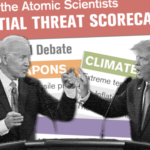The guns of October
By Dan Drollette Jr | October 13, 2017
“He is extraordinarily restless, dashes back and forth, … intervenes in the leadership of the generals, gives countless and often contradictory orders, and scarcely listens to his advisers. He always wants to win and when the decision … is against him, takes it ill.”
Sound familiar? It’s not who you think it is.
Here’s another hint: “[he is] superficial, hasty, restless, unable to relax, without any deeper level of seriousness, without any desire for hard work or drive to see things through to the end, without any sense of sobriety, for balance and boundaries, or even for reality and real problems, uncontrollable and scarcely capable of learning from experience, desperate for applause and success—as Bismarck said early on in his life, he wanted every day to be his birthday.”
Give up?
The two quotes above, by a German Army Chief of Staff and distinguished historian Thomas Nipperdey of Cambridge University, respectively, both refer to Germany’s Kaiser Wilhelm II—who comes across as a spoiled teenager, prone to rash and bellicose remarks that undermined his country’s image and international position.
They’re all just part of a fascinating article by Stephen M. Walt in Foreign Policy about the many parallels between the current president of the United States and the emperor of Germany over 100 years ago. Both men were insecure and undisciplined—and in charge of governments in thrall to the military. Both men led lives of privilege from birth, were extraordinarily thin-skinned, and prone to destructive public comments; in a notorious 1908 interview with the London Daily Telegraph, for example, the Kaiser declared: “You English are mad, mad, mad, as March hares”—which did not cool the frantic arms race between the two countries. (“One wonders what he would have said on Twitter,” notes Walt.)
Titled “The Donald Trump-Kaiser Wilhelm parallels are getting scary,” the story delves into the unfortunate personality traits shared by the two leaders—and the striking similarities between the underlying conditions in Wilhelmine Germany and the United States today. Much like today’s America, “military dominance distorted German thinking about its security and led to an over-reliance on military power and an overly confrontational foreign policy,” writes Walt.
And as the story notes, there are also some important differences between then and now—but not necessarily for the better in the nuclear era: “The ‘adults in the room’ (James Mattis, H.R. McMaster, John Kelly, etc.) may have been able to temper some of Trump’s worst instincts, but he’s still managed to withdraw from the Trans-Pacific Partnership, alarm key allies, cause a precipitous drop in global confidence in the United States, undermine the Iran deal, fuel escalating tensions on the Arabian Peninsula, and repeatedly pour gasoline on the delicate situation with North Korea.”
And we all know how things worked out in 1914.
Publication Name: Foreign Policy
To read what we're reading, click here
Together, we make the world safer.
The Bulletin elevates expert voices above the noise. But as an independent nonprofit organization, our operations depend on the support of readers like you. Help us continue to deliver quality journalism that holds leaders accountable. Your support of our work at any level is important. In return, we promise our coverage will be understandable, influential, vigilant, solution-oriented, and fair-minded. Together we can make a difference.
Topics: Special Topics, What We’re Reading















